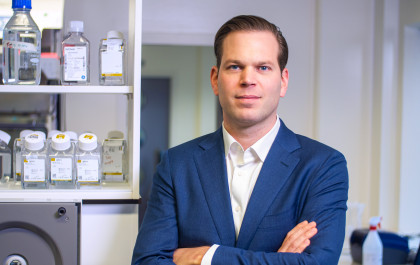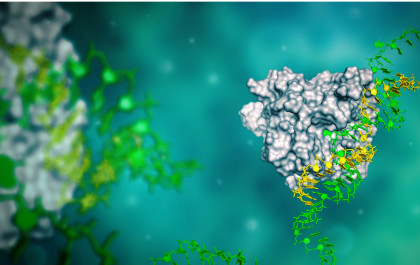ProQR Completes Enrollment of its Pivotal Trial of Sepofarsen for the Treatment of LCA10
- Top-line results expected H1 2022
- Sepofarsen is a potential first-in-class RNA therapy for the treatment of LCA10, a rare inherited retinal disorder that leads to blindness
LEIDEN, Netherlands & CAMBRIDGE, Mass., Jan. 07, 2021 (GLOBE NEWSWIRE) -- ProQR Therapeutics N.V. (Nasdaq: PRQR) (the “Company”), a company dedicated to changing lives through the creation of transformative RNA therapies for inherited retinal diseases (IRDs), today announced it has completed patient enrollment in its Phase 2/3 Illuminate study of sepofarsen for the treatment of Leber Congenital Amaurosis 10 (LCA10) due to the p.Cys998X mutation in the CEP290 gene. With enrollment completed, top-line results are expected in the first half (H1) of 2022.
Illuminate is a Phase 2/3 trial, which randomized 36 patients aged eight years or older to receive either sepofarsen at the target registration dose, a low dose, or sham treatment. The primary endpoint of this study is mean change from baseline in Best Corrected Visual Acuity (BCVA) at Month 12, at the registration dose versus sham. This trial is intended to support application for marketing approval of sepofarsen for patients with LCA10 due to the p.Cys998X mutation in the CEP290 gene.
“We are pleased to have completed enrollment of the pivotal Illuminate trial of sepofarsen. This marks an important milestone for ProQR, as well as for the LCA10 and broader inherited retinal disease community. In surpassing our enrollment target, we were able to accommodate the broad interest to participate in the trial,” said Aniz Girach, MD, Chief Medical Officer of ProQR. “This speaks to the fact that there are currently no approved treatments for patients with LCA10. If approved, sepofarsen has the potential to be the first therapy to address this high unmet medical need for patients who would otherwise face blindness. We are grateful to those who have supported our efforts in bringing this trial forward, including our investigators, patients, and caregivers. We look forward to sharing the top-line results in the first half of 2022.”
The Illuminate study was initiated based on data from a Phase 1/2 study, which indicated that at Month 12, patients treated with sepofarsen had an improvement in visual acuity, as measured by BCVA. In a subset of patients (n=6) who were treated at the target registration dose, the mean change from baseline for BCVA at Month 12 was -0.93 LogMAR, equivalent to approximately 9 lines improvement (or 45 letters) on the ETDRS chart. In the Phase 1/2 study, concordant improvements in measures of full-field stimulus testing (FST) and mobility were also observed, which are secondary endpoints in the Illuminate trial.
“LCA10 is a severe inherited retinal disease that leads to blindness, and for which there is currently no treatment,” said Katarina Stingl, MD, Professor at University of Tuebingen, Center for Rare Eye Diseases (Germany). “Completing enrollment of the Illuminate trial marks an important milestone for the LCA10 community, as well as the IRD community as a whole, as we seek to advance new treatments for this patient group.”
Laura Manfre, Chair and Co-Founder of Sofia Sees Hope, a patient advocacy organization dedicated to those affected by LCA and other rare retinal diseases shared, “As the parent of a child with an LCA diagnosis, I was told there was nothing that could be done and that we needed to accept that our daughter would one day be blind. Now, in early clinical testing we have seen the potential for sepofarsen to make a significant difference for patients with LCA10 due to a mutation in the CEP290 gene. We see hope for individuals living with this disease. We look forward to learning about the results of the Illuminate trial, and continuing to work with ProQR as they advance their pipeline of RNA therapies to potentially help children, adults, and families who are affected by blindness caused by LCA and other rare inherited retinal diseases.”
Sepofarsen has been granted orphan drug designation in the United States and the European Union and received fast-track designation and rare pediatric disease designation from the FDA as well as access to the PRIME scheme by the EMA.
About Leber Congenital Amaurosis 10 (LCA10)
Leber Congenital Amaurosis (LCA) is the most common cause of blindness due to genetic disease in children. It consists of a group of diseases of which LCA10 is the most frequent and one of the most severe forms. LCA10 is caused by mutations in the CEP290 gene, of which the p.Cys998X mutation has the highest prevalence. LCA10 leads to early loss of vision causing most people to lose their sight in the first few years of life. To date, there are no treatments approved that treat the underlying cause of the disease. Approximately 2,000 people in the Western world have LCA10 because of this mutation.
About Sepofarsen
Sepofarsen (QR-110) is being evaluated in the pivotal Phase 2/3 Illuminate trial and is a first-in-class investigational RNA therapy designed to address the underlying cause of Leber congenital amaurosis 10 due to the p.Cys998X mutation (also known as the c.2991+1655A>G mutation) in the CEP290 gene. The p.Cys998X mutation leads to aberrant splicing of the mRNA and non-functional CEP290 protein. Sepofarsen is designed to enable normal splicing, resulting in restoration of normal (wild type) CEP290 mRNA and subsequent production of functional CEP290 protein. Sepofarsen is intended to be administered through intravitreal injections in the eye and has been granted orphan drug designation in the United States and the European Union and received fast-track designation and rare pediatric disease designation from the FDA as well as access to the PRIME scheme by the EMA.
About ProQR
ProQR Therapeutics is dedicated to changing lives through the creation of transformative RNA therapies for the treatment of severe genetic rare diseases such as Leber congenital amaurosis 10, Usher syndrome and retinitis pigmentosa. Based on our unique proprietary RNA repair platform technologies we are growing our pipeline with patients and loved ones in mind.
Learn more about ProQR at www.proqr.com.
FORWARD-LOOKING STATEMENTS
This press release contains forward-looking statements. All statements other than statements of historical fact are forward-looking statements, which are often indicated by terms such as "anticipate," "believe," "could," "estimate," "expect," "goal," "intend," "look forward to", "may," "plan," "potential," "predict," "project," "should," "will," "would" and similar expressions. Such forward-looking statements include, but are not limited to, statements regarding sepofarsen (QR-110) and the clinical development and the therapeutic potential thereof, including timing of clinical trials and results from such clinical trials. Forward-looking statements are based on management's beliefs and assumptions and on information available to management only as of the date of this press release. Our actual results could differ materially from those anticipated in these forward-looking statements for many reasons, including, without limitation, the risks, uncertainties and other factors in our filings made with the Securities and Exchange Commission, including certain sections of our annual report filed on Form 20-F. These risks and uncertainties include, among others, the cost, timing and results of clinical trials and other development activities that may be slowed or halted by the COVID-19 pandemic; the likelihood of our clinical programs being executed on the intended timelines; our reliance on contract manufacturers to supply materials for research and development and the risk of supply interruption from a contract manufacturer; the potential for future data to alter initial and preliminary results of early-stage clinical trials and the unpredictability of the duration and results of the regulatory review of applications or clearances that are necessary to initiate and continue to advance and progress our clinical programs. Given these risks, uncertainties and other factors, you should not place undue reliance on these forward-looking statements, and we assume no obligation to update these forward-looking statements, even if new information becomes available in the future, except as required by law.
ProQR Therapeutics N.V.
Investor Contact:
Sarah Kiely
ProQR Therapeutics N.V.
T: +1 617 599 6228
skiely@proqr.com
or
Hans Vitzthum
LifeSci Advisors
T: +1 617 535 7743
hans@lifesciadvisors.com
Media Contact:
Alison Chen
LifeSci Communications
T: +1 646 876 4932
achen@lifescicomms.com


